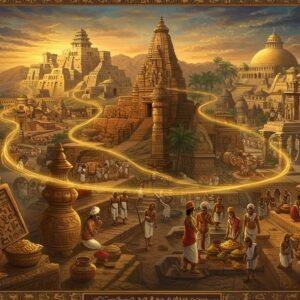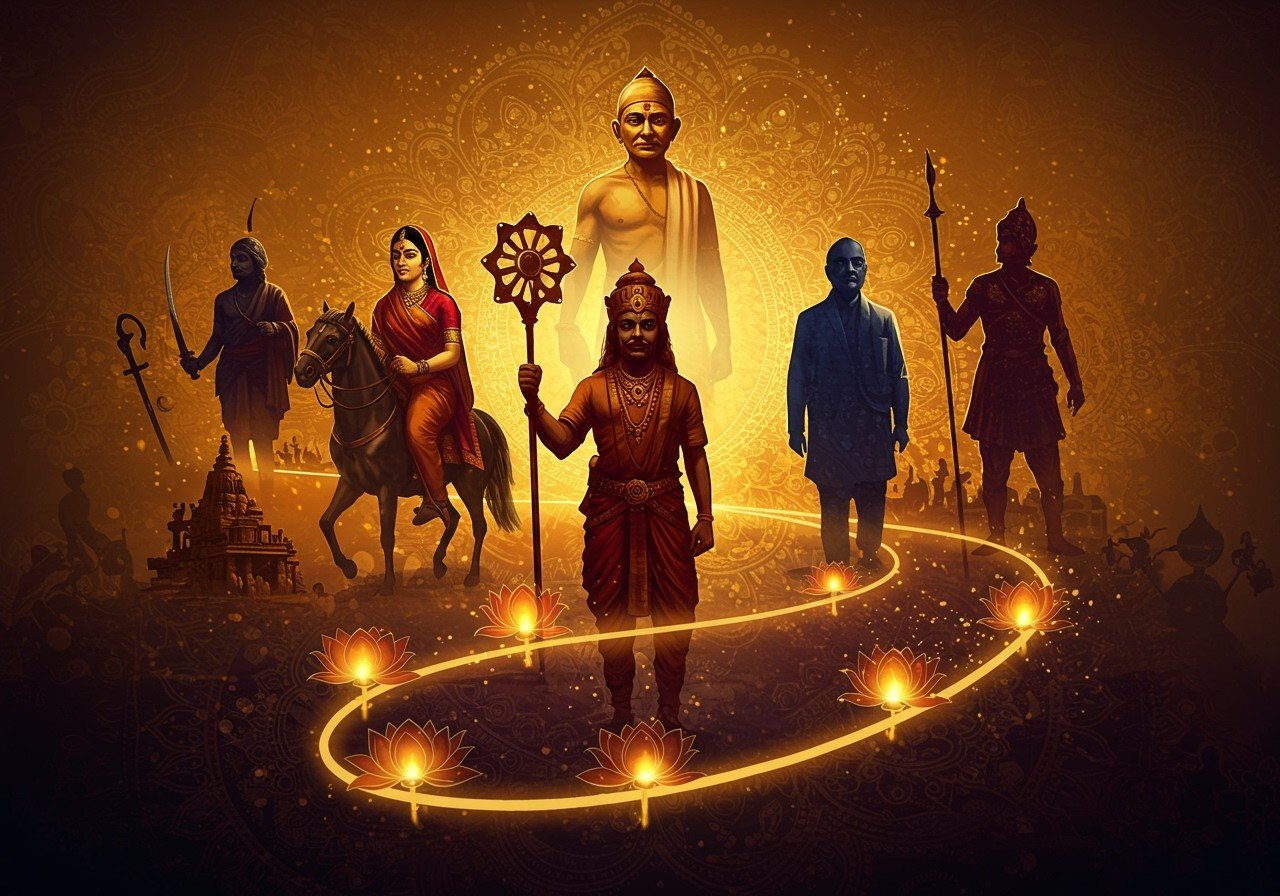
India’s history is a rich tapestry woven with the threads of countless influential figures. From ancient scholars meticulously documenting the past to modern leaders shaping the nation’s destiny, these personalities have left an indelible mark on India’s trajectory. This article delves into their contributions and explores their lasting impact on the country, celebrating the diverse tapestry of Indian history.
Ancient and Medieval Historians: Preserving India’s Rich Heritage
These chroniclers played a vital role in preserving India’s rich heritage, meticulously documenting events, societal structures, and cultural nuances of their times. Their dedication and passion for capturing history have allowed us to glimpse into the past and understand the foundations upon which modern India is built.
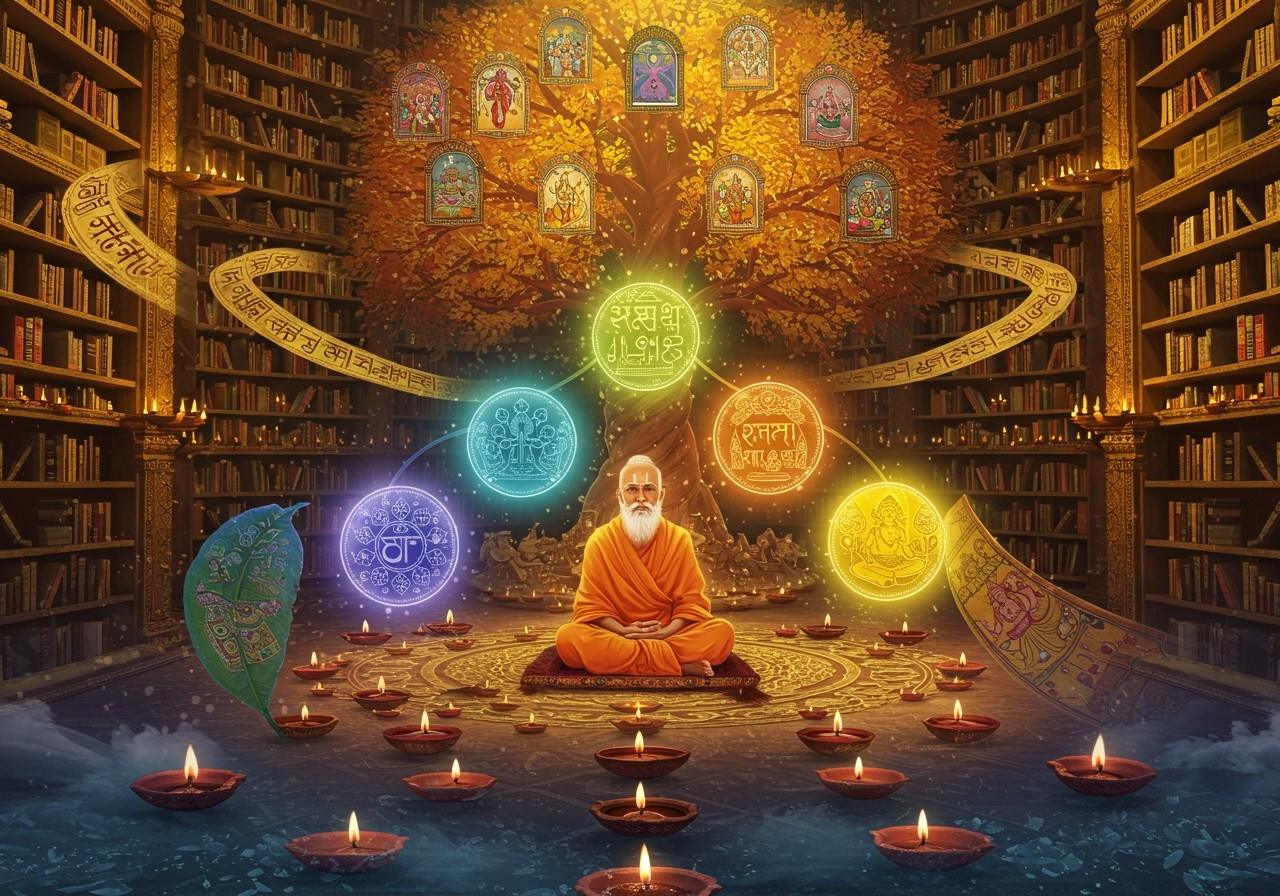
Delve deeper into the world of Hindu scriptures and their historical significance.
Early Chroniclers of India
- Megasthenes (4th Century BCE): A Greek ambassador to the court of Chandragupta Maurya, Megasthenes authored “Indica,” offering invaluable insights into the Mauryan Empire and providing one of the earliest Western accounts of ancient India. His observations covered various aspects of Indian society, from governance and administration to social customs and religious practices.
- Kalhana (12th Century CE): Kalhana, a Kashmiri historian, penned “Rajatarangini,” a chronicle detailing the history of Kashmir. This meticulous work is considered a pioneering achievement in historical writing, offering a detailed account of the region’s rulers, dynasties, and significant events spanning centuries.
- Alberuni (11th Century CE): A Persian scholar and polymath, Alberuni’s meticulous study of India, documented in his writings, offers a comprehensive understanding of 11th-century Indian society. His works explore diverse subjects, including astronomy, mathematics, and medicine, providing a holistic view of the era’s intellectual and cultural landscape.
- Banabhatta (7th Century CE): Banabhatta, a renowned Sanskrit prose writer and poet, served as the court poet of King Harshavardhana. His most famous work, “Harshacharita,” is a biographical account of King Harsha’s life and reign, offering valuable insights into the political and social dynamics of 7th-century India.
- Ziauddin Barani (14th Century CE): Ziauddin Barani, a Muslim historian during the Delhi Sultanate, chronicled the reigns of several sultans in his work “Tarikh-i-Firoz Shahi.” His writings provide crucial historical details about the political landscape and societal changes during this period.
- Abdul Fazl (16th Century CE): Abdul Fazl, a scholar and vizier in the court of Emperor Akbar, is renowned for his works “Akbarnama” and “Ain-i-Akbari.” These writings offer a comprehensive account of Akbar’s reign, covering administrative reforms, military campaigns, and the diverse cultural landscape of the Mughal Empire.
Colonial Era Historians: Documenting India Under British Rule
These historians played a crucial role in shaping our understanding of India’s colonial past. Their work serves as a reminder of the resilience and strength of our ancestors, who navigated a complex period of change and transformation.
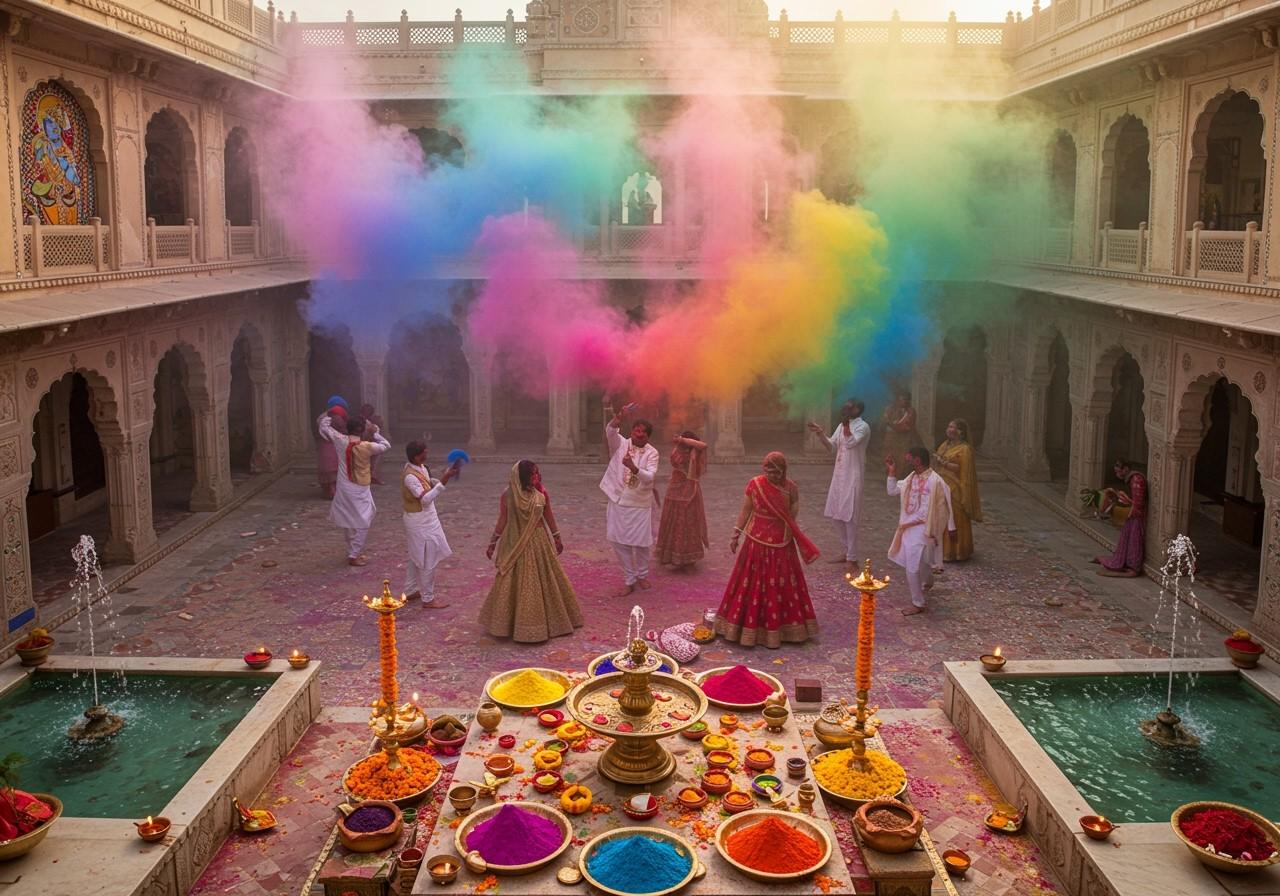
Explore the colorful history and celebration of Holi, a festival deeply rooted in Indian culture.
Documenting India Under British Rule
- James Mill (19th Century CE): James Mill’s “The History of British India” offers a colonial perspective on Indian history. While valuable for its detailed account, it’s essential to approach this work with an awareness of its inherent biases and colonial viewpoint.
- William Dalrymple (Contemporary): William Dalrymple, a renowned historian and writer, provides a nuanced view of India during the British era in his book “The Last Mughal.” This work delves into the decline of the Mughal Empire and the rise of British power, offering a rich narrative of the period.
- John Keay (Contemporary): John Keay’s “India: A History” offers a comprehensive and extensive research-based exploration of Indian history, spanning from ancient times to the modern era. This book is a valuable resource for understanding the complexities of Indian history.
- Vincent Arthur Smith (20th Century CE): Vincent Arthur Smith’s “Oxford History of India” remains a significant reference for understanding Indian history. This comprehensive work covers various periods and aspects of India’s past, offering a detailed overview for students and scholars.
- Sir Jadunath Sarkar (20th Century CE): Sir Jadunath Sarkar, a prominent historian, dedicated his work to studying the Mughal era. His meticulous research and detailed writings provide valuable insights into the political, social, and cultural dynamics of the Mughal Empire.
- Romesh Chunder Dutt (19th-20th Century CE): Romesh Chunder Dutt’s economic history of India offers a critical perspective on British policies and their impact on the Indian economy. His work provides an important counterpoint to colonial narratives.
Modern Historians: Shaping Contemporary Indian History
Modern historians continue to explore and interpret India’s vast history, bringing new insights and understanding to our past. Their research and analysis enrich our understanding of India’s complex journey and offer valuable perspectives on contemporary issues.
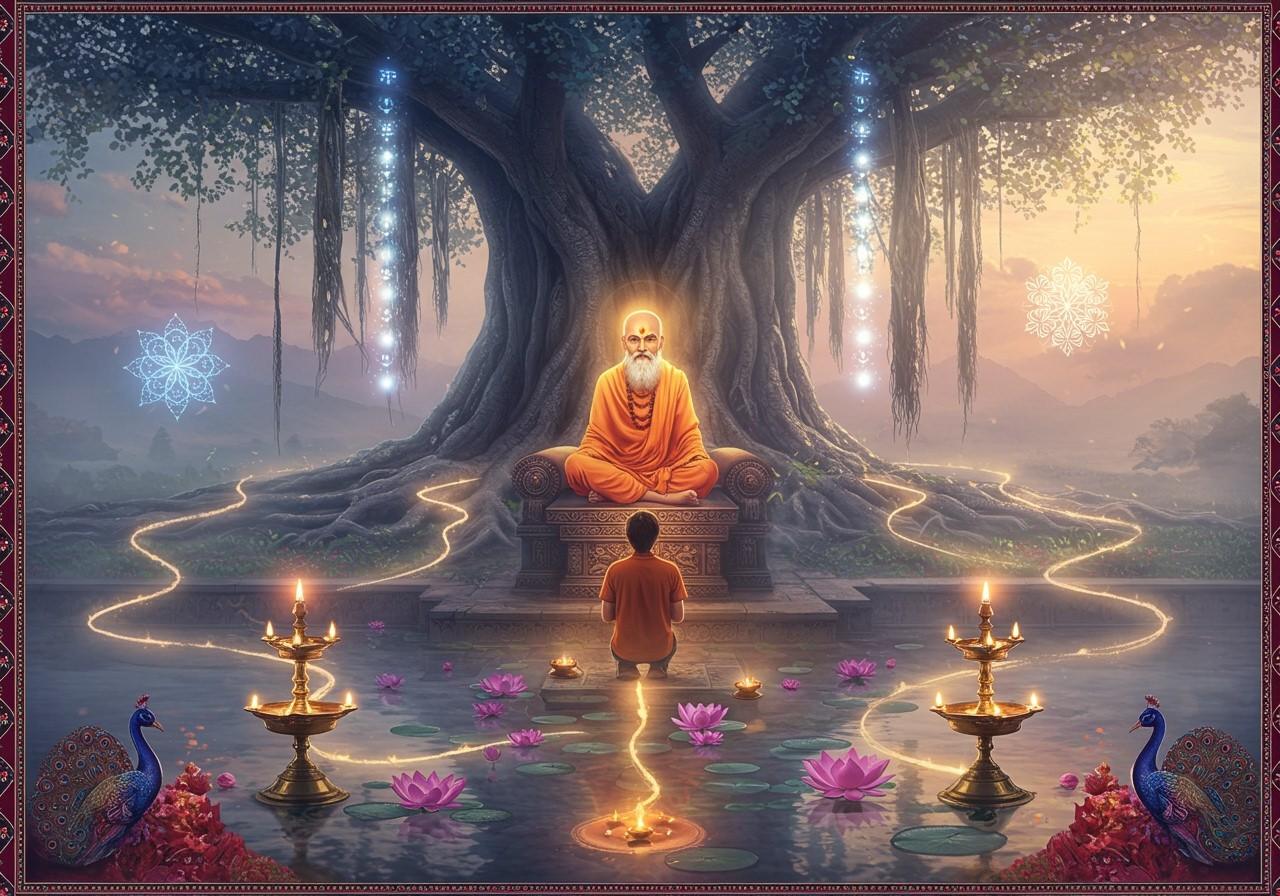
Embark on a spiritual journey and find guidance with resources available on Poojn.in.
Shaping Contemporary Indian History
- Ramachandra Guha (Contemporary): Ramachandra Guha’s “India After Gandhi” offers a detailed account of post-independence India, exploring the challenges and triumphs of nation-building in the decades following 1947. His work provides valuable insights into the complexities of modern India.
- Bipan Chandra (20th-21st Century CE): Bipan Chandra is a prominent historian known for his work on the Indian freedom struggle. His book “India’s Struggle for Independence” is a seminal text, offering a detailed and insightful analysis of the movement that led to India’s freedom.
- Romila Thapar (Contemporary): Romila Thapar is a highly influential historian known for her scholarly works on ancient Indian history. Her rigorous research and insightful interpretations have shaped our understanding of ancient India’s social, political, and cultural dynamics.
- Irfan Habib (Contemporary): Irfan Habib is a renowned historian known for his Marxist interpretation of Indian history. His work offers a critical perspective on historical events and societal structures through a Marxist lens.
- Ram Sharan Sharma (20th-21st Century CE): Ram Sharan Sharma’s groundbreaking research on ancient India has significantly contributed to our understanding of this period. His work explores various aspects of ancient Indian society, from economic structures to social hierarchies.
Other Notable Figures
Beyond historians, numerous figures have profoundly impacted India’s trajectory. Leaders like Shivaji, the Maratha warrior-king known for his courage and military prowess, and B.R. Ambedkar, the jurist and social reformer who championed equality and fought against discrimination, have shaped India’s governance, social fabric, and cultural identity. Their contributions reflect the diverse tapestry of Indian history and its ongoing evolution.
Honoring Our Historians: A Legacy of Knowledge
The contributions of these key figures in Indian history are invaluable. They have meticulously chronicled our past, offering a window into the lives, events, and ideas that have shaped our nation. By preserving their works and acknowledging their tireless efforts, we honor their legacy and ensure that future generations can learn from our rich and diverse heritage. Their writings remind us of our resilience, cultural richness, and remarkable achievements. By studying their works, we can continue to appreciate and learn from India’s profound history, using it as a foundation to build a brighter and more informed future. Let us continue to celebrate and respect the work of these historians, keeping their legacy alive in our hearts and minds.
Find authentic Tulsi Kanthi Mala at Poojn.in to enhance your spiritual practice.

